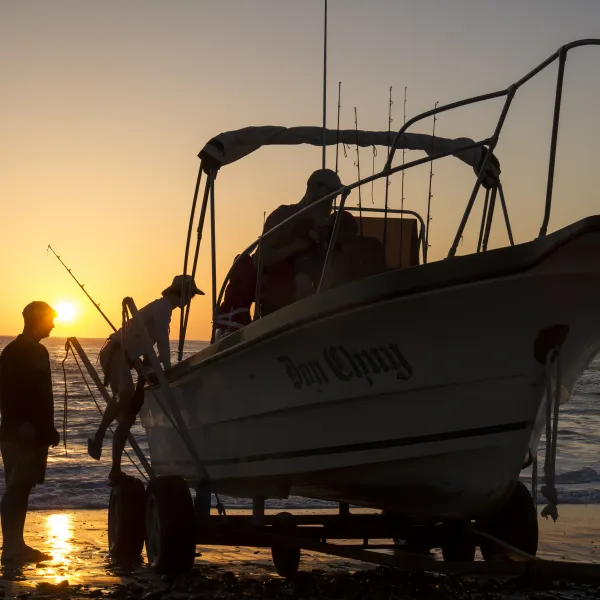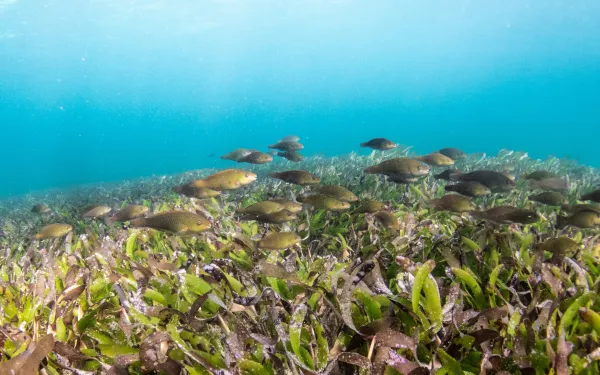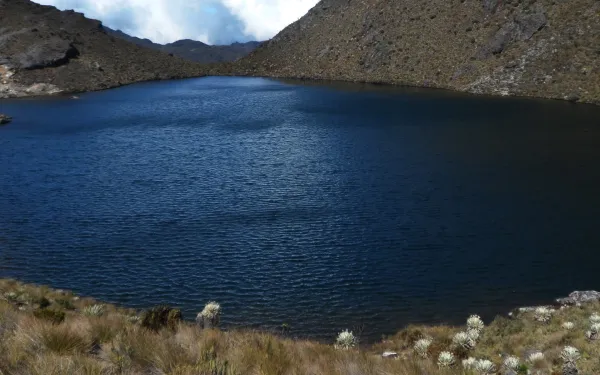
Project
Photo: Carlos AguileraProtecting the rich marine life of Cabo Pulmo Reef
Cabo Pulmo Reef, a 20,000-year-old ecological treasure in Baja California Sur, Mexico, hosts many of the 800 marine species in the Sea of Cortez.
Overfishing almost killed it in the 1980s. But the Mexican government intervened in 1995 to declare it a national park. Since then, the reef has grown, and the surrounding ecosystem has prospered.
Developers repeatedly try to build enormous tourist resorts at Cabo Pulmo. The proposed resorts typically include tens of thousands of hotel rooms, golf courses, an airport, sports clubs, and more—and require new housing development for thousands of employees.
Coral reefs like Cabo Pulmo are extremely vulnerable to the impacts of such poorly planned development. Sewage and wastewater runoff cause a surge in the growth of algae that blocks sunlight, causing the reef to bleach and die.
Fertilizers, herbicides, and pesticides from golf courses contaminate ocean currents and upset the delicate ecological balance of the area. Boating, fishing, and diving stress and break reefs, too.
In an area where water is scarce, tourism infrastructure projects could overexploit aquifers that are already suffering the impacts of climate change.
AIDA's work has been instrumental in ensuring the survival and health of Cabo Pulmo's ecosystems. We continue monitoring the situation and working with national partners to make legal protections for the reef stronger and permanent.
Partners:

Related projects

Small investments with great impacts. Territorial gender-just climate solutions
Since 2016, the Global Alliance for Green and Gender Action (GAGGA), together with other actors, has promoted a series of initiatives to strengthen the inclusion of a gender perspective in climate finance, particularly within the projects and financial flows of the Green Climate Fund (GCF).The GCF is the first international climate finance fund to incorporate a gender perspective as a central pillar of its operations, becoming a key framework for advancing equity in the access, use, and allocation of climate resources globally.However, international climate finance that reaches countries is often disconnected from the actual needs of the local communities it is meant to benefit— especially women. This poses a critical issue that demands urgent attention— communities have the right to participate in decisions that directly affect them. At the same time, it misses the opportunity to incorporate local knowledge into solutions— knowledge that could make them more relevant and effective in addressing the climate crisis. In its special report on climate change and land, the Intergovernmental Panel on Climate Change (IPCC, 2022) highlights that incorporating women’s knowledge of land management helps mitigate degradation and supports the adoption of integrated adaptation and mitigation measures.Gender-responsive climate finance goes beyond allocating resources to women and promoting gender equality—it requires rethinking how financial and climate solutions are designed and implemented. This means acknowledging the diversity of women, removing barriers to resource access, defunding so-called ‘false solutions’, and supporting initiatives that tackle the structural causes of climate change.In Latin America and the Caribbean, many local climate solutions remain unknown to decision-makers. As a result, they struggle to receive support, be replicated, or serve as inspiration for other initiatives benefiting the same communities. This publication presents five case studies of successful, locally developed climate solutions with a focus on gender and climate justice. The goal is to strengthen collaboration between those responsible for providing and implementing GCF resources and civil society organizations.The case studies show the efficiency that can be achieved when resources are channeled directly to civil society organizations and communities. All the projects were carried out with budgets under USD 50,000 and made significant contributions to transforming the structural conditions that heighten the vulnerability of territories, women, and other marginalized groups in the face of the climate crisis. Read and download the publication
Read more
The natural wonders we could protect with the High Seas Treaty
For decades, the ocean has protected us from the impacts of climate change, absorbing 90 percent of the excess heat produced by global warming. It’s given us food and the genetic resources we use to produce life-saving drugs. As if that weren’t enough, it’s enabled millions of families to thrive in an economy based on its bounty.Despite its importance, the ocean remains unprotected in large part; no country governs the high seas, international waters that comprise 64 percent of the ocean’s total surface area. Management measures have given rise to a patchwork of uncoordinated protections.To fill this gap, in June 2023, UN member countries formally adopted an agreement to protect biodiversity in the high seas, which requires ratification by at least 60 countries to enter into force.The High Seas Treaty - short name for the Agreement on the Conservation and Sustainable Use of Marine Biological Diversity of Areas beyond National Jurisdiction (BBNJ Agreement) - proposes, among other aspects, the creation and adequate management of marine protected areas (MPAs) in the high seas, regions that would allow for the conservation and rescue of the rich biodiversity found in the ocean. Protection at a high costIn addition to absorbing a large part of the planet’s excess heat, the ocean absorbs nearly 30 percent of all greenhouse gases, which are responsible for climate change.But this protective role comes with serious consequences. By interacting with and absorbing pollutants such as carbon dioxide, the ocean suffers from acidification - a phenomenon that reduces the levels of calcium, an element necessary for the shells and external skeletons of several species of marine fauna - and loss of oxygen, essential for life under the sea.These impacts consequently affect the food supply and employment in the fishing and tourism industries.Faced with the impacts of the climate crisis on marine ecosystems, governments must do much more to protect the ocean, starting with ratifying the High Seas Treaty, which establishes a clear legal framework and process for maintaining its health and resilience. Protected natural wondersAs the ratification of the High Seas Treaty progresses, there is growing interest from governments and civil society to lay the groundwork for greater protection of the high seas.As part of this push, areas of high ecological value have been identified that could form the first wave of protection once the treaty goes into effect. High Seas Alliance - a coalition of organizations of which AIDA is a member - has highlighted 8 priority sites that could be part of this first generation of MPAs, which it has called the Hidden Natural Wonders of the World:Salas y Gómez and Nazca Ridges: Deep in the waters of the southeastern Pacific, these two unique chains of submarine slopes and peaks are separated from South America by the waters of the Humboldt Current and the enormous chasm of the Atacama Trench. They are critical habitats and migratory corridors for at least 82 threatened or endangered species, along with many others of ecological and economic importance.The Termal Dome: Each year in the eastern tropical Pacific, strong seasonal winds push warm waters from the coast offshore, where they meet cooler waters carried by ocean currents. This interaction causes a unique upwelling system that brings cold, nutrient-rich waters to the sea surface, benefiting many species.Emperor Seamounts: Located in the North Pacific, this chain of more than 80 seamounts extends for 2,000 kilometers on the seafloor between the northwesternmost point of the Hawaiian Islands and the Kuril-Kamchatka Trench (Pacific Northwest). Its nutrient-rich waters feed a great diversity of species. And in the mountains, a range of corals and sponges shelter countless species of fish and invertebrates.Walvis Ridge: It is a range of seamounts that extends for about 3,000 kilometers off the coast of southwestern Namibia to the mid-Atlantic ridge (submarine ridge that runs along the Atlantic Ocean). It is composed of several seafloor types and includes many features of the deep ocean floor, along with its abyssal plains, seamounts and guyots (seamounts).Sargasso Sea: It is the only sea in the world without land borders. It is geographically defined by four Atlantic Ocean currents in an area of about 1,100 kilometers wide and 3,200 kilometers long. It is called the “golden rainforest of the high seas” because of the sargassum algae that float on its surface and provide habitat for a myriad of species, while absorbing and storing carbon and producing oxygen.South Tasman Sea: Located between Australia and New Zealand, it is a diverse and dynamic area that supports abundant marine life. It is also an important breeding area and migratory corridor for a large number of species, including endangered species such as the Antipodean albatross, which often transit its waters.The Lost City: It is a complex of 30 hydrothermal vent chimneys located on the upper slopes of the Atlantis seamount massif in the North Atlantic Ocean. The complex of vents rises 4,300 meters from the seafloor, with peaks at a depth of 750 meters. The Lost City chimneys are believed to be more than 120,000 years old.Saya de Malha: Located in the heart of the Indian Ocean, midway between the Seychelles and Mauritius, this unique seascape is home to the world’s largest seagrass community. It is a rare example of seagrass meadows on the high seas and the largest submerged ocean bank in the world, covering more than 40,000 square kilometers.Preserving these natural wonders through marine protected areas requires the entry into force of the High Seas Treaty.It is time to take care of the ocean as it takes care of us.
Read more
UN experts denounce threats and stigmatization against defenders of water and the Santurbán páramo; demand protection for their work
Bucaramanga, Colombia. On March 6, 2025 the United Nations Special Rapporteurs on human rights defenders, a healthy environment, water and sanitation, and the UN Working Group on Business and Human Rights sent formal letters to the governments of Colombia, Canada, and the United Arab Emirates, as well as to the companies Aris Mining and MDC Industry Holding Company LLC to denounce the threats and stigmatization faced by the Committee for the Defence of Water and the Santurbán Páramo for defending this ecosystem threatened by mining in Colombia. To date, only the Colombian government’s reply has been made public. While harassment is not new, content has recently been disseminated on social media labeling the Committee’s spokespersons as "persona non grata", endangering their lives by claiming false connections to illegal armed groups. Committee members have warned that "every day that passes without a response from the national government and the companies legitimizes those who seek to silence us".For 16 years, the committee has worked to protect the Santurban páramo - a high altitude wetland ecosystem which provides fresh water to more than two million people. Recently, they achieved recognition of part of the páramo as a Temporary Reserve Zone, which means that large-scale mining activities will be suspended for two years.Viviana Herrera, Latin America Program Coordinator at MiningWatch Canada, said, "it speaks volumes that Canada has not yet responded to the UN experts. Canada must prioritize the environmental defenders of the Santurbán Committee and their struggle to protect water."Sebastián Abad Jara, an attorney with the Interamerican Association for Environmental Defense (AIDA), said that "through these letters, the offices of the UN recognized the committee as a coalition of rights defenders; they informed governments and companies of the clear, imminent, and specific risk to its members; and in doing so they dismantled the false narratives linking their activities to those of illegal groups."The UN agencies emphasize that Aris Mining, its subsidiary Minesa, and all companies in its supply chain associated with the Soto Norte project — such as Calimineros — have an obligation to respect and protect human rights, especially those of environmental and water defenders."Colombia is one of the most dangerous countries for those defending water and life against extractive projects, which is why immediate action by states and companies is urgently needed to stop the stigmatization and guarantee the safety of members of the committee," said Jen Moore, associate researcher at the Institute for Policy Studies (IPS).The Committee for the Defence of Water and the Santurbán Páramo, AIDA, MiningWatch Canada, IPS, Common Frontiers Canada, and the Center for International Environmental Law (CIEL) reiterate the call by United Nations experts to the governments of Colombia, Canada, and the United Arab Emirates, as well as to Aris Mining company and MDC Holding, to safeguard the lives and integrity of the committee members.In accordance with their obligations under national law, the Escazú Agreement, inter-American law and jurisprudence, and the Guiding Principles on Business and Human Rights, we also urgently call on states and companies to respond to the substance of the letters and adopt measures — with verifiable deadlines and measurable progress — to prevent companies associated with the Soto Norte project from committing human rights violations.Only the protection and strengthening of historic leadership such as that of the Santurbán Committee in Colombia will bring us closer to environmental and climate justice. The concerns raised by the offices of the UN are a reminder that protecting those who lead the struggle for water in Latin America is an imperative of state and corporate due diligence.Press contactsCommittee for the Defense of Water and the Santurbán Páramo, [email protected] Quintanilla (Mexico), AIDA, [email protected], +5215570522107Viviana Herrera, Mining Watch Canada, [email protected], +14389931264Jennifer Moore, IPS, [email protected], +12027049011
Read more